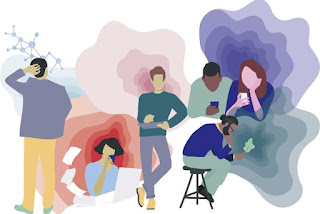India's Postpartum Depression: A Quiet Mental Health Emergency for New Mothers
Written by Bhopal's senior
psychiatrist, Dr. Sanjeet Diwan
‘ Emotional Cost of Motherhood’
The most blissful stage of a woman's
life is frequently depicted as motherhood. But behind those happy photos and
baby showers is a reality that is frequently overlooked: postpartum depression
(PPD). PPD is a rising public health issue that affects almost 22% of Indian
women and has an effect on both the mental health of expectant mothers and the
development of their unborn children.
The top psychiatrist in Bhopal, Dr. Sanjeet Diwan, discusses the often-ignored symptoms of postpartum
depression, its rising incidence in India, and the importance of prompt
treatment in this blog.
Postpartum Depression: What Is It?
A mood disorder that develops after
childbirth is called postpartum depression. Unlike "baby blues,"
which usually go away in a week or two, PPD is much more severe and lasts
longer, making it difficult for a mother to take care of both herself and her
child.
Major Cause includes- The dramatic shifts in
hormone levels after childbirth, particularly estrogen and progesterone, are
thought to play a significant role. These hormonal fluctuations can affect mood
and emotional well-being, making some women more vulnerable to PPD.
Read Also: Depression Treatment In Bhopal
Why Is India Seeing an Increase in
Postpartum Depression?
The following distinct social,
cultural, and economic elements are causing PPD to increase among Indian women:
1) Ignorance
In India, the majority of women (and
families) are not aware that postpartum depression is a medical condition. Many
times, emotional distress is written off as "normal" postpartum
behavior.
2) The stigma associated with mental
health
In many regions of India, mental
health is still considered taboo. A mother is perceived as being emotionally
weak or ungrateful if she displays sadness or disconnection.
3) Pressures from a Joint Family
A new mother might not have privacy
or autonomy in many homes. Emotional stress can be exacerbated by ongoing
pressure from in-laws and social expectations.
4) Preference for a boy
The birth of a girl can cause
disappointment in some areas, which exacerbates a mother's mental anguish.
5) Isolation in the City
Mothers in nuclear families,
particularly those in cities, frequently do not receive the emotional and
physical support they need, which causes them to feel alone and anxious.
6) Identity Crisis and Career Breaks
After giving birth, professional
women who take a break may lose their identity, sense of value, and financial
independence, all of which can lead to depression.
Read Also: Sleep Disorder treatment In Bhopal
Effects of Mental Health on Women
·
A higher chance of developing chronic depression
·
Feelings of guilt and low self-esteem
·
Problems with the baby's bond
·
Social disengagement and marital discord
·
Postpartum psychosis risk in extreme situations
Postpartum depression can develop
into long-term mental health problems if treatment is not received. The
emotional growth of the infant and the general well-being of the family are
also impacted.
Psychiatrist Dr. Sanjeet Diwan's
diagnosis and treatment in Bhopal
In Madhya Pradesh, Dr. Sanjeet Diwan has helped hundreds of women who are suffering from
postpartum depression. His strategy consists of:
·
Mental health screening and clinical assessment
·
Individualized treatment (supportive psychotherapy, cognitive
behavioral therapy)
·
If necessary, take safe medication.
·
Sessions of family counseling
·
Lifestyle recommendations for sustained well-being
Dr. Diwan highlights:
Postpartum depression is not a
weakness or a flaw in one's character. It is completely treatable and is a
biological and psychological reaction to one of the most significant life
transitions for a woman.
The Significance of Awareness
·
Postpartum mental health screening is required in hospitals.
·
Early warning signs should be taught to families.
·
Women need to feel free to express their feelings without
fear of criticism.
·
Access to mental health services and support groups must be
improved.
When Is It Time to Get Help?
·
If symptoms like below continue for more than two weeks,
consult a psychiatrist:
·
Feeling depressed, hopeless, or numb
·
Often crying
·
Feeling cut off from your child
·
Having difficulty eating or sleeping
·
Ideas of hurting oneself or the unborn child
Dr. Sanjeet Diwan-Helping Mothers
heal
Don't suffer in silence if you or a
loved one is experiencing postpartum depression. Women experiencing emotional
challenges following childbirth can receive compassionate, evidence-based care
from leading psychiatrist Dr. Sanjeet Diwan in Bhopal.
Book a private consultation right now https://www.bestpsychiatristbhopal.com/ or Call +91 9098356914



Comments
Post a Comment